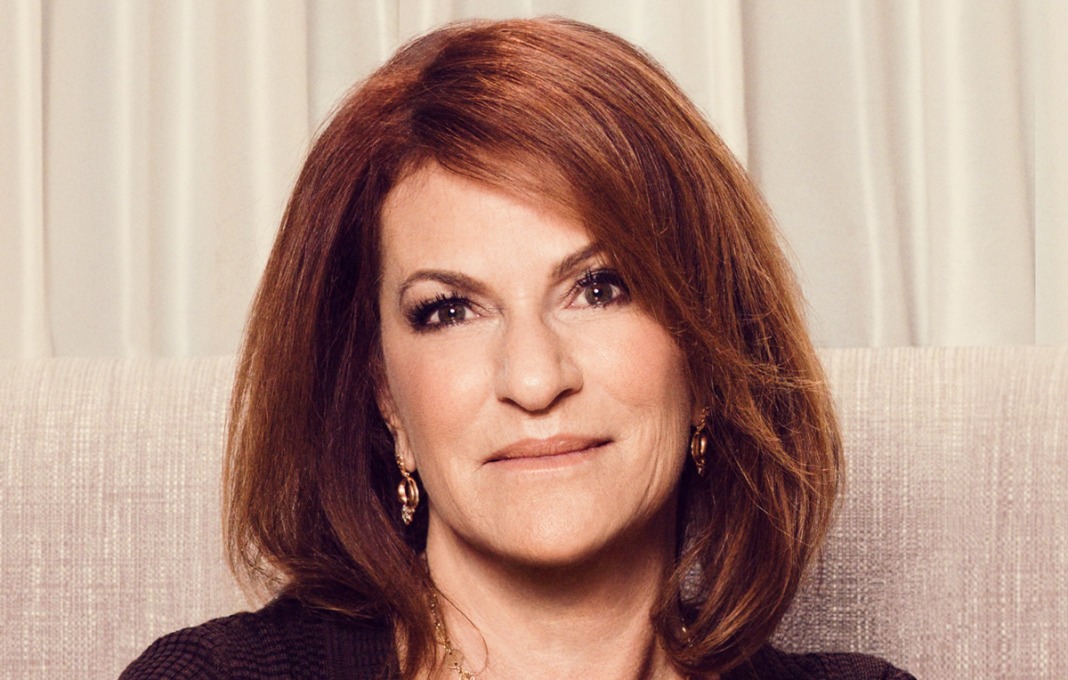Things have changed since Sandra Stern, vice chairman of powerful media conglomerate Lionsgate Television, began as an entertainment lawyer in the 1980s. “Every client that would come in would take a look at me and say, ‘Can you get me a coffee?’,” she remembers. “Because a woman lawyer was a unicorn.”
Today, Stern oversees everything that goes into production, from concept to post-production, from legal to business decisions—and nobody’s asking her for coffee. She’s still a rare exception as a woman at the top of entertainment, but it isn’t quite as lonely, and she’s learned plenty of lessons she’s willing to talk about with other women looking to be leaders in any kind of field.
Stern will share that wisdom in the first of our four-part Women in Leadership Series on July 25 (join us!). In anticipation, she spoke about where things are at for women in business today, what skills are important to cultivate and how #MeToo has changed industry forever.
You’ve been with the same company for 20 years. How did you get into entertainment and law? I know you have an M.A. in comparative literature from the City University of New York.
I am a dyed in the wool New Yorker. My background was in literature. I didn’t know exactly what that meant, and I certainly knew nothing coming from New York about television. I mean, I had a television. But I never really gave any thought to TV as a business.
After my Master’s I thought maybe teaching was the right career path and I met with the head of comp lit at UCLA about whether he thought I should complete my PhD. And he said, no, if you want a job, go to law school. So I did.
Something I like to advise people to do is, look at your unique skills. You know, none of us are fungible. We each have specific skills. What do you bring to any career that you’re looking at, that others don’t? What is your unique superpower or talent, or scale or perspective that I just don’t have?
When I got out of the law school I looked around. I litigated very briefly. And I thought, Well, what do I have to bring? And what I have to bring is a knowledge and an appreciation for storytelling. I did not at that point want to write for television. But I realized I can add a different perspective from any other aspiring entertainment lawyer because of that unique background. And so I got a first job at the predecessor of Sony at the time, Columbia Pictures Television, in the legal department. And then I moved from the legal side, which I did like, to the business side, which I liked even more, into the management side.
And now I’m vice chairman of Lionsgate Television. And I oversee pretty much everything that goes into all of the components of making a TV show—business and legal and finance and production and post-production, as well as the development of programming.
You just took your new post in December, right?
I had been president of the TV group. I was promoted to vice chairman. My duties didn’t really change. I got a fancy new title and more money, but pretty much the same job which I was overseeing: the soup to nuts of television. From the moment an idea walks in your door, all through the development, sales, production process and into the distribution.
Maybe because of my background in comparative literature, I like the notion of how things manifest not just in one culture, but cross culturally, and so I’ve always been interested in developing programming for the international marketplace. And out of that market. I just spent nine months picking up a series from an Israeli company. It’s going to be done in Hebrew and German.
Some of Israeli TV is the best. Some amazing series have come out of there…
It’s very, very interesting. The business has changed, and the world has, thanks, I think, to the global streamers, Netflix and Amazon and Apple, recognized that audiences are not only diverse but more adaptable than we give them credit for. Maybe they weren’t 10 years ago, maybe they just weren’t given the opportunity, but they are perfectly happy today to read subtitles and listen to series with actors with foreign accents, to watch series with actors that don’t necessarily look like Americans, whatever that means.
So I am always looking at acting series that are cross cultural, in Israel, in India. And then there’s the question, what can we do for global consumers? Series adapted from those in the U.S.? Looking at foreign production is interesting to me. It is an interesting way of recognizing the global nature of the world and the cross-cultural nature of what it is that we do.
So even though you’re saying it’s important to know what you’re good at, maybe another lesson for women is to be able to look broadly at things and really have the ability to move across categories and across definitions if you want to be in leadership?
I think that that’s right. Those are just two very important things, and sort of distinct: know what your skills are, know what you are using your skills on, as in my case, I am a really good businessperson and I have a strong background in storytelling. So as a lawyer, I could be a litigator. But what is my opportunity to maximize? If I can combine skills that I have that are uniquely mine, that’s how to find success.
And once you do that…
Then I have to look at things that I have no background in but I have strengths that apply, which is a unique perspective, an immense curiosity, interest in a lot of different things. How does this work? And can I take this and adapt it to something else?
Be flexible and innovative if you want to be a leader. There are a lot of ways to be a good executive, to be a good worker. If you want to be a leader, I think you need to have an additional skill set, or it might be an additional whole set of skill sets: adaptability, innovation, curiosity and the ability to lead by example.
Those are leadership qualities, in addition to the skills that you need to be good at your particular job. The leadership qualities that I have developed over the years I could apply to any number of industries, like the qualities of curiosity, innovation, flexibility. Those are the qualities that will help you succeed in any job.
You talk about the importance of challenging the status quo. Why is that critical for women in particular? And what ways have you done that?
Well, look, as a woman in the entertainment business, a woman in the legal business, I am accustomed to being an orphan, the only one in the room. My first job as a lawyer, I was the only woman at that law firm. I am currently a member of a very, very small group of women at the head of entertainment companies.
For me, early on, it was just an unwillingness to be distracted. Well, this is hard, to be the only woman in the room but you put your head down, do the best job you can, and know that you’ll work harder and better than anybody else in the room. And that those skills and your abilities and results will speak for themselves.
Don’t give anyone an excuse to disregard you?
Right. It’s a little different today and as a woman who has been successful after so many years at it, I think I have an added responsibility and obligation, and that is to be able to be a mentor and an inspiration and an assistant to women who are trying to navigate in, for most of us, largely male-dominant or historically male-dominated businesses. How can we help and inspire and mentor women?
We have to be mindful of the fact that we are in a different situation in a different position. We have to think about things that men don’t have to think about. I don’t want to diminish that or minimize it, pretend that that’s not an issue. But as somebody coming up in the business my focus had to be on how do I earn my place in the room, right? Because it’s not just going to be given to me. I’m going to have to earn that place, and that means taking on things that a man in my position wouldn’t have to, working harder than a man in my position, perhaps, would have to.
Do you think there are more opportunities now than there were for you in the ‘80s? How can women find their moments of opportunity?
It’s a very, very good question. I work for a public company, and my company, like most public companies today, actively looks to recruit women and other undeserved minorities. It’s more than just a flippant approach. I think it’s a legitimate attempt to be more inclusive on a day-to-day basis.
But the reality does not always live up to the best intentions. It’s just easy for people to rely on what they know, and to call on the friends and the people that they’ve always looked to. Historically, there were fewer opportunities for women. There are currently fewer women with the experience, with the skills, to maybe get that great job. So companies have to, I won’t say make allowances, because that sounds like tokenism, and it sounds like we’re unworthy. But to take a chance on somebody who is smart and eager and enthusiastic. I’m willing to put in the time, even if that person doesn’t have 30 years’ experience behind her.
I think most companies are doing their best and trying to create opportunities. We can no longer do what’s been done over the years. We are now mandated in a, I think, very positive way to entertain a variety of candidates: women, people of color, people of different sexual and gender backgrounds.
What I’m saying is, certainly in my business, it’s a moment of opportunity for women. And it’s now our job to show what we can do.
I want to ask you about the #MeToo movement. Obviously sexual harassment and abuse is an issue across industries, but there’s been a lot of publicity around the issue in entertainment. Do you think that’s still something women have to contend with on a big scale? Is that something you see as a big challenge for women?
My business is a bit unique. Most businesses, you know, you go to an office, and this is not to suggest that that there is not sexism and improper behavior. Yeah, that that can take place in an office between 9 o’clock in the morning and 6 o’clock in the afternoon, but in my business, much of business is done outside the office in social settings, for actors. Your work takes place in very intimate settings, sometimes in bed, sometimes in stages of undress. As an industry, we are very, very mindful now. Something that we did not used to have but do now: intimacy coordinators on every set. There is somebody monitoring for actors the level of intimacy, and making sure that there is a level of comfort around what they’re being asked to do. We have a zero-tolerance policy.
In a good way, right?
Yes, we are trying to create safe workspaces, safe and comfortable spaces, with awareness and maybe a little bit of fear of God. A lot of powerful people I have known well for many, many years have found themselves out of work and called out. When they were coming up, it was I don’t know about acceptable, but tolerated. It is no longer tolerated.
Look, I think for as long as you’re going to have powerful men, you’re going to have abuse.
But having powerful women as well helps?
Well, we are frequently abused as well. There is no height at which you are immune. But I do think being powerful is not simply about having a powerful job.
Being powerful is also about being empowered.
At every level in the hierarchy, including a low-level assistant who is empowered as a woman to stand up for herself and call out bad behavior. That’s our goal, I think. Not simply to have a category where you’re OK. I’m a chairman, so I’m immune, but anybody below me watch out. It’s our job as a society to empower everybody. And not simply women. It is not unheard of for men to come forward. Our HR department has dealt with this. The men have come forward and said, that woman show runner has behaved in a way that’s made me uncomfortable. That woman director touched me in a way that made me feel uncomfortable. We have a code of conduct for everybody, for every single person that we employ on every single set.
What have been your biggest challenges as a woman along the way to your current position?
Oh, my God! You know what, I’ve been doing this for a long time. The world has changed over the years from the time when I was at my first law firm right out of law school, and every client that would come in would take a look at me and say, “Can you get me a coffee?” Because a woman lawyer was a unicorn. It was inconceivable, you know, in the ‘80s.
It’s a subtlety, and I don’t think that this is unique to my business or my time. Women deal with a cultural boys’ club. A young male executive is invited by his boss to join a golf outing or to go to a baseball game, and there it is. Those are social things that introduce you to professional contacts who can be useful to you. And who can mentor you, promote you, help you. It gives you an opportunity to spend time in a social setting with your boss, who now knows you.
Women are not given those same opportunities. That is the reality of how business is done, regardless of what rules of professional conduct you might have, or how your company looks at inclusiveness. As a society, we need to look at it. That’s why I look at the obligation that I have, that women like me who have the good fortune to be rewarded, have to support, to mentor other women and help bring them along. Balance it out a bit.
Is it OK for women to be ambitious? Do you need to be ambitious to be a leader? The culture has been hard on ambitious women. And then there’s been a shift for everyone away from work-is-everything toward a better work-life balance.
Those are really good points that you make there, but they are different points.
My father used to say, “You need to be hungry in order to eat,” and I think that that is true. Women have historically not been ambitious or not acted on ambition; somehow that was perceived, as you know, as unseemly or aggressive, or whatever. But ambition is maybe a little bit of a charged word for a striving for excellence, an insistence on being recognized for what you do and an insistence on being appreciated and rewarded for what you do.
But of course, if you want to exceed and succeed, ambition is essential.
The second part of your question is, I think, societal. And I think it probably applies equally to men as to women, which is, what are we doing with our lives? I just came back from France, and it is a very nice country, and people manage to do just fine despite the fact people go home at a reasonable hour at night, take lengthy summer vacations. They figure out how to have a work-life balance. Is that a good thing for us? That’s a bigger philosophical question. Because we are ambitious, and, you know, working all hours. It is the reality.
All those things are changing, and men often are equal participants in raising the children, in taking care of the home and families and couples figure out how to divide up the labor of living, right? But the fact is, it is more challenging for women to figure out how to have it all.
It’s a lifestyle question for any individual woman. She may make a decision that either for a period of time in her life, or maybe for her entire life, she is going to sacrifice her career goal for personal goals, and for every individual woman, just like every individual man, that’s a personal decision and I can’t make that decision for anybody or advise anybody what to do.
But the reality is any woman can go as far as her talents, and drive, and ambition, and hard work can take her and that I think the goal of our society, the goal of the current women’s movement, is not to simply say to women, we’re on one side. This is the only way. I think our goal should be to give every woman the opportunity to get as far as her own personal talents and ambition can take her.









